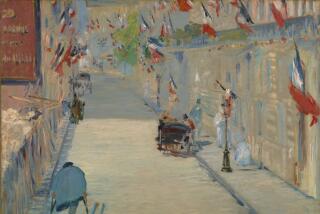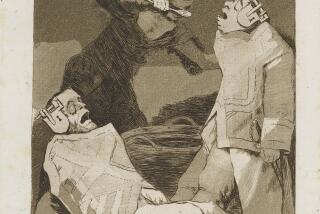Influences framed in art, books, film
- Share via
WHILE Edouard Manet was transforming painting in 19th century France, his countrymen Gustave Flaubert, Emile Zola and Guy de Maupassant were bringing French literature into the modern age by creating novels and stories that dealt realistically with everyday life.
And there are interesting, slightly convoluted cinematic ties.
“Zola turns Flaubert’s realism into naturalism with his fascination with the lower depths and the workings of the world -- socially, politically and sexually,” says David Pendleton, programmer at the UCLA Film and Television Archive. “Then he influences Frank Norris, the American writer, who goes on to write ‘McTeague,’ which Von Stroheim films as ‘Greed.’ That film influences Jean Renoir to rethink his own filmmaking and to make ‘Nana’ -- not to mention that Renoir’s father was one of the great Impressionist painters. It’s all bound together.”
With Manet’s “Bar at the Folies-Bergere” being showcased alongside the Getty Center’s current exhibition “Defining Modernity: European Drawings 1800-1900,” the museum and UCLA are presenting a four-film series this week, “The Belly of Paris: Flaubert, Maupassant and Zola on Film.”
The festival opens Thursday at the Getty’s Harold M. Williams Auditorium with Rene Clement’s “Gervaise,” an acclaimed 1956 adaptation of a Zola novel, starring Maria Schell as a beautiful young club-footed woman whose family life spirals downward because of alcoholism.
“This is Rene Clement trying to match Zola’s naturalism,” says Pendleton. “There is a lengthy cat fight with Gervaise and another laundress in a laundry which is quite violent, and there are a number of scenes of grotesque gatherings of dwellers in the lower depths feasting on goose.”
Screening Friday is Max Ophuls’ 1952 drama “Le Plaisir,” based on three short stories by Maupassant: An old man disguises himself as a young man so that he can dance at a ball; a group of prostitutes goes to the country to see the communion of the madam’s niece; and jealousy drives a painter to immobilize the beautiful woman he adores.
Vincente Minnelli’s 1949 version of Flaubert’s “Madame Bovary” is scheduled for Saturday afternoon. Jennifer Jones plays the role of the immoral Emma Bovary; Van Heflin plays her husband; Louis Jourdan is her handsome lover.
Despite the novel’s adult reputation, the film made it past Hollywood’s uber-moral Production Code by taming the tale via a framing device featuring James Mason as the author.
Though the device seems creaky today, “it does serve to emphasize the way Flaubert seems to have identified or sympathized with Madame Bovary,” says Pendleton. “You can kind of feel Minnelli doing the same thing.”
The festival concludes Saturday evening with a screening of Renoir’s 1926 version of Zola’s “Nana,” starring his then-wife, Catherine Hessling, as the actress and courtesan who ensnares men in her lair of lust and deception.
“Nana” was just Renoir’s second film. The expensive production was a flop, and it was years before Renoir would again be able to make such an ambitious film.
As to why it failed, a lot of the blame has been put on Hessling’s diminutive shoulders.
“Catherine Hessling’s performance was controversial,” says Pendelton. “Nana is supposedly someone who bewitches men with her physical presence. And in the film, she doesn’t have that. What are compelling about her are her will and her drive, as opposed to simply her physical presence.”
Renoir would revisit the world of Zola with much more success in 1933’s “Madame Bovary” and in his 1938 classic, “La Bete Humaine,” starring his frequent collaborator, Jean Gabin.
--
--
‘The Belly of Paris’
Where: Harold W. Williams Auditorium, Getty Center, 1200 Getty Center Drive
When: Thursday through Saturday
Price: Free
Contact: (310) 440-7300 or go to www.getty.edu/visit/events/paris_films.html
Schedule
Thursday: “Gervaise,” at 7:30 p.m.
Friday: “Le Plaisir,” 7:30 p.m.
Saturday: “Madame Bovary,” 4 p.m.
Saturday: “Nana,” 7:30 p.m.
More to Read
The biggest entertainment stories
Get our big stories about Hollywood, film, television, music, arts, culture and more right in your inbox as soon as they publish.
You may occasionally receive promotional content from the Los Angeles Times.











